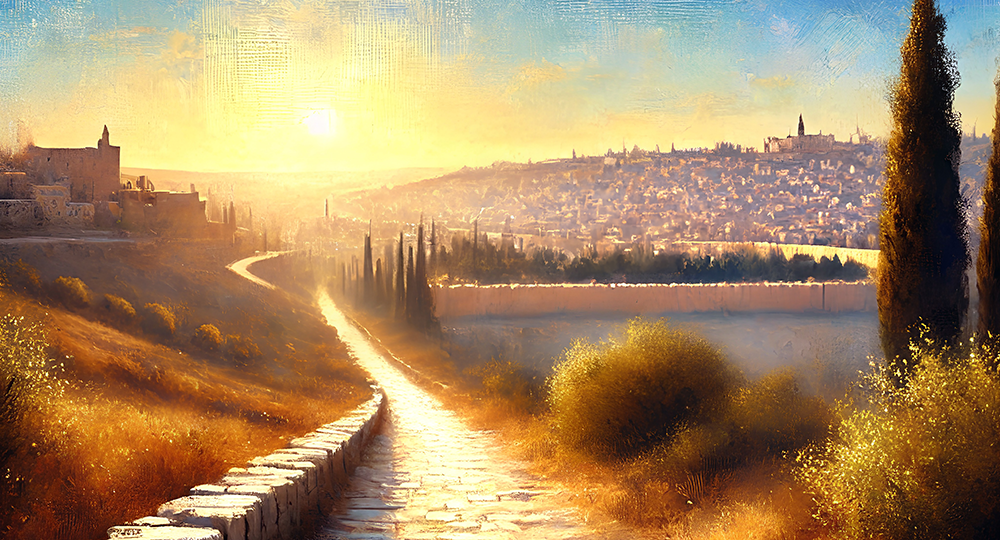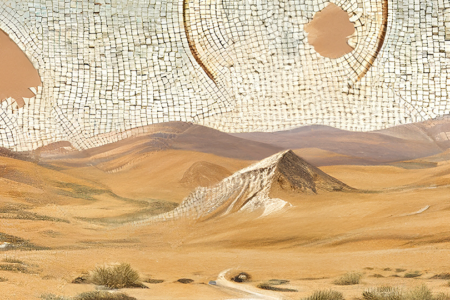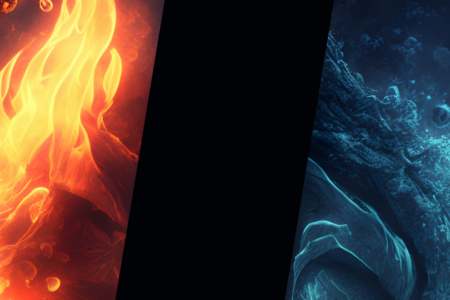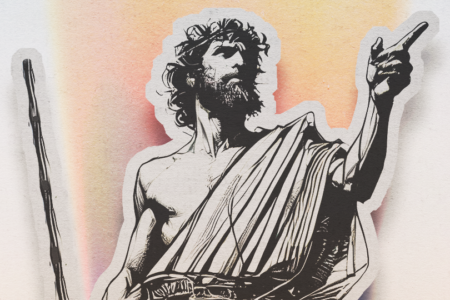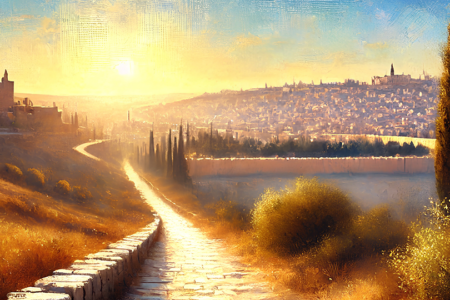The Greatest Messenger
John’s was the voice crying in the wilderness, “Prepare the way of the Lᴏʀᴅ!”
For 400 years, Israel had not heard a word from God. From Moses (ca. 1400 BC) to Malachi (ca. 400 BC), God sent many prophets to His people to chastise them, warn them, encourage them, and tell them about the future. But after Malachi, He sent no one until He raised up the son of the Jewish priest Zacharias, a man named Yochanan, who has come to be known as John the Baptist.
John was born when Herod the Great ruled Judea for the Roman Empire that controlled the Holy Land. With no prophet for four centuries, the Jewish people understandably began questioning the unusual Levite who was baptizing people in the Jordan River and encouraging Israel to repent.
“Who are you?” they asked. “What do you say about yourself?” (Jn. 1:22). To answer them, John turned to the prophet Isaiah, to whom God had entrusted a wealth of Messianic information.
Not the Messiah
Messianic fervor was high when John appeared. Israel was looking for its Mashiach, Hebrew for “Christ.” “I am not the Christ,” John told Israel’s spiritual leaders (v. 20).
“What then? Are you Elijah?” they asked (v. 21).
“I am not,” John declared (v. 21). They asked about Elijah because God said through Malachi,
I will send you Elijah the prophet before the coming of the great and dreadful day of the Lᴏʀᴅ. And he will turn the hearts of the fathers to the children, and the hearts of the children to their fathers, lest I come and strike the earth with a curse (Mal. 4:5–6).
Finally, they asked, “Who are you, that we may give an answer to those who sent us? What do you say about yourself?” (Jn. 1:22).
So, John shared what he had been taught through the years by his parents, quoting Isaiah 40:3: “I am the voice of one crying in the wilderness: ‘Make straight the way of the Lᴏʀᴅ”’ (Jn. 1:23).
Isaiah’s prophecy was given more than 700 years before John was born. Isaiah chapters 1—39 address God’s judgments on Judah, while chapters 40—66 address Israel’s restoration and future hope. Isaiah 40 begins, “‘Comfort, yes, comfort My people!’ says your God” (v. 1).
How would this comfort be realized? In part, through God’s messenger, who would prepare the way for the Messiah—the Lord:
The voice of one crying in the wilderness: “Prepare the way of the Lᴏʀᴅ; make straight in the desert a highway for our God. Every valley shall be exalted and every mountain and hill brought low; the crooked places shall be made straight and the rough places smooth; the glory of the Lᴏʀᴅ shall be revealed, and all flesh shall see it together; for the mouth of the Lᴏʀᴅ has spoken” (Isa. 40:3–5; cf. Lk. 3:4–6).
God also said through Malachi, “Behold, I send My messenger, and he will prepare the way before Me. And the Lord, whom you seek, will suddenly come to His temple, even the Messenger of the covenant, in whom you delight” (Mal. 3:1).
Due to John’s unusual ministry, which involved water baptism and pointed messages calling for repentance, John made quite a stir. After the Romans threw him in prison, Jesus extoled him and made it clear that Yochanan was the messenger of Isaiah 40 and Malachi 3:1:
What did you go out into the wilderness to see? A prophet? Yes, I say to you, and more than a prophet. For this is he of whom it is written: “Behold, I send My messenger before Your face, who will prepare Your way before You” (Mt. 11:7, 9–10).
Then Jesus added, “Assuredly, I say to you, among those born of women there has not risen one greater than John the Baptist. And if you are willing to receive it, he is Elijah who is to come” (vv. 11, 14).
The Elijah Prophecy
Clearly, John fulfilled Isaiah 40:3–5 and Malachi 3:1. Jesus Himself said so, as do the Gospels (Mt. 3:3–4; Mk. 1:1–3; Lk. 1:76; Jn. 1:23).
But confusion remains concerning the Elijah prophecy of Malachi 4:5. Even Jesus’ disciples asked Him, “Why then do the scribes say that Elijah must come first?” (Mt. 17:10). Jesus explained it this way:
“Indeed, Elijah is coming first and will restore all things. But I say to you that Elijah has come already, and they did not know him but did to him whatever they wished. Likewise the Son of Man is also about to suffer at their hands.” Then the disciples understood that He spoke to them of John the Baptist (vv. 11–13).
John was not Elijah risen from the dead but, rather, a prophet like Elijah; and the similarities between these two men are great:
1. Both preached repentance (1 Ki. 18:21; Mt. 3:1, 2).
2. Both wore animal-skin clothing (2 Ki. 1:7–8, ESV; Mt. 3:4).
3. Both preached against the ungodly behavior of their evil kings (1 Ki. 18:18; Mt. 14:3–4).
4. Both lived in the wilderness (1 Ki. 17:3; Lk. 1:80).
5. Both ministered during a time of spiritual darkness in Israel (1 Ki. 21:25; Lk. 1:79).
6. Both confronted idolatry (1 Ki. 18:21; Lk. 3:7–9).
This list is not exhaustive. The parallels between John’s and Elijah’s ministries show that John indeed came in the power and spirit of Elijah. Both men were unique in their day and culture and clearly were used of God in extraordinary ways.
But did John the Baptist fulfill the Elijah prophecy? Indeed, his preaching led many to repentance. Bible scholars call it a “near” fulfillment of Malachi 4:5–6, with a “distant” fulfillment remaining before Christ Himself returns to Earth following the Great Tribulation.
The Elijah mentioned in Malachi will appear before the “dreadful day of the Lᴏʀᴅ” (4:5). Malachi 4 actually opens with, “For behold, the day is coming, burning like an oven” (v. 1), which sets the context. In the Hebrew Scriptures, the “day of the Lᴏʀᴅ” always refers to the future judgment period we know as the Great Tribulation (Isa. 34:8; Joel 2:31; Mt. 24:21; Rev. 16:14).
Since Elijah did not die but was taken up to heaven in a whirlwind by a chariot of fire (2 Ki. 2:11) and was later seen with Moses and Jesus on the Mount of Transfiguration (Mt. 17:3), it may well be that the fulfillment of Malachi 4:5–6 is found in Revelation 11, where God sends two witnesses to Earth who later are killed (vv. 7–10) and publicly resurrected (vv. 11–12).
Bible scholar Mark Hitchcock speculated, “These two witnesses are Moses and Elijah.” He substantiated his view by stating they are both mentioned in Malachi 4:4–6 and both appeared with Jesus on the Mount of Transfiguration: “These two giants from the past, the great lawgiver and the great prophet, will visit earth again in one of the great encores of all time.”1 While there are differing, credible views concerning these two end-times witnesses, this view seems to fit the context of Malachi well.
John the Baptist stands out as a unique prophet who played a unique role at a unique point in history. God chose him to pave the way for Jesus’ First Coming; and he did so in the spirit of another powerful prophet, Elijah.
Malachi was Israel’s final prophetic voice for 400 years until John the Baptist broke the silence and humbly declared, “He [Jesus Christ] must increase, but I must decrease” (Jn. 3:30).
The same holds true today. Jesus must increase because He is the Lord.
ENDNOTE
-
-
- Mark Hitchcock, The End (Carol Stream, IL: Tyndale House, 2012), 348.
Photo: Adobe Stock
-
